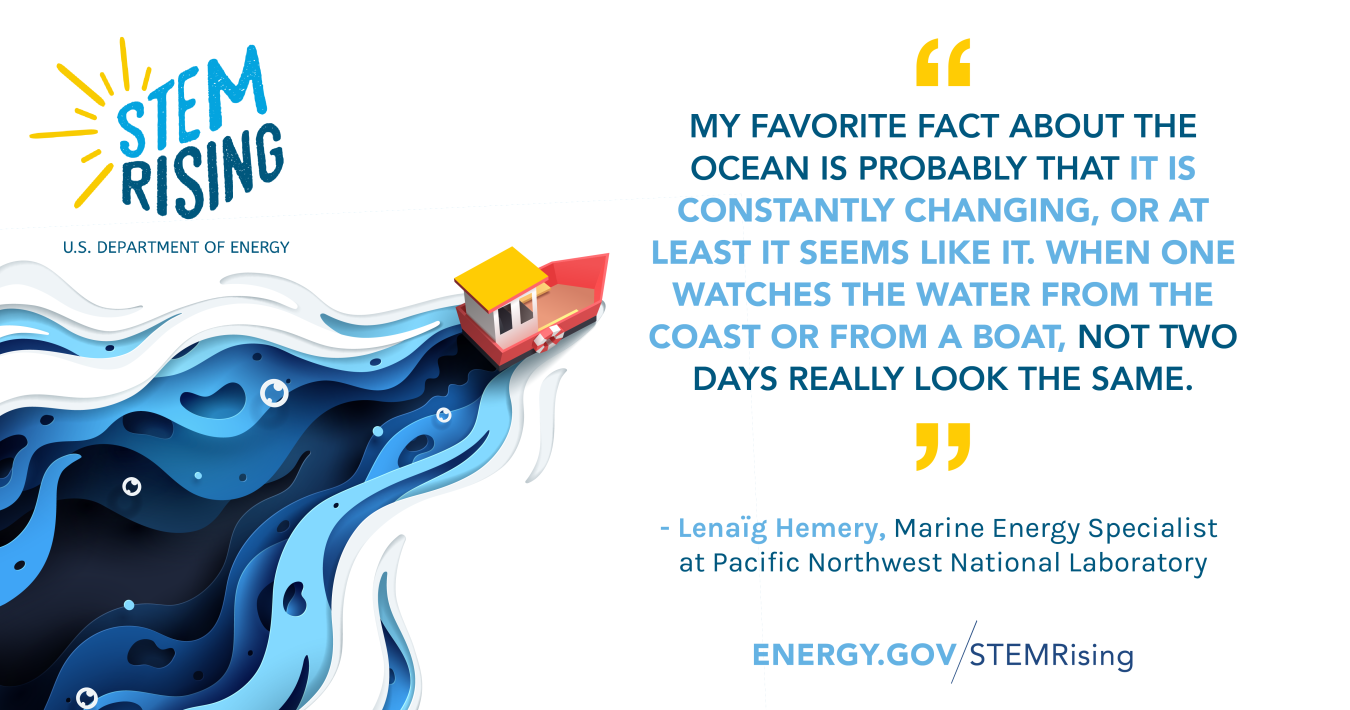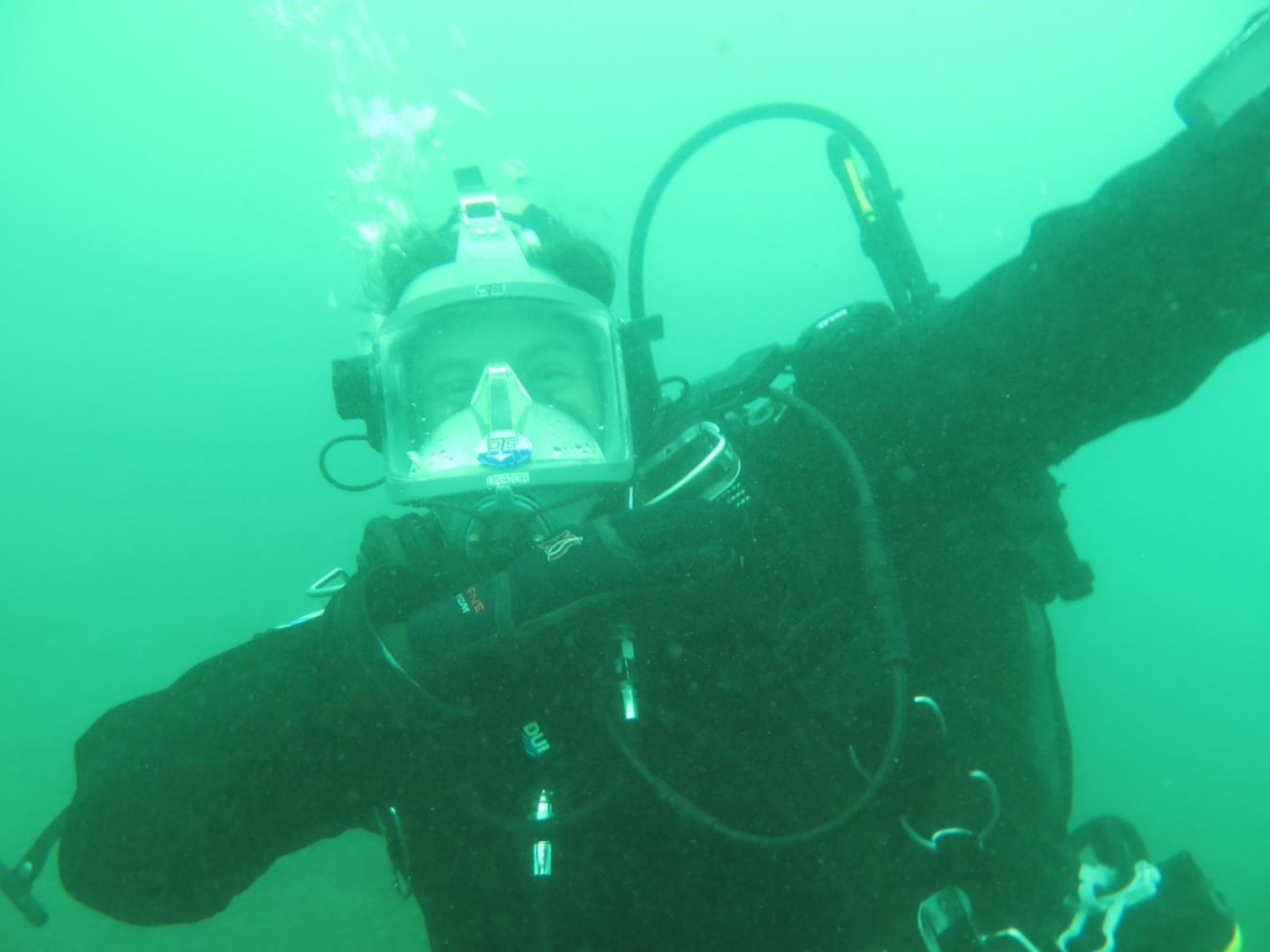Learn why Lenaïg Hemery loves her job as a marine energy specialist at Pacific Northwest National Laboratory.
June 30, 2020
June is Ocean Month, and to celebrate STEM Rising is sharing profiles of Energy Department staff in ocean-related careers. Meet Lenaïg Hemery.
My name is Lenaïg Hemery and I am a marine energy specialist at Pacific Northwest National Laboratory. I am a benthic ecologist by training, which means that I study the organisms that live on or near the seafloor, their habitats, and relationships among each other and with their environment. And I am a naturalist by passion, curious about various topics like mycology, astronomy, and geology.

What’s your favorite fact about the ocean?
My favorite fact about the ocean is probably that it is constantly changing, or at least it seems like it. When one watches the water from the coast or from a boat, not two days really look the same. A scientist who studies the diversity of communities through space and time would need to take into account daily, seasonal, and multi-annual variabilities to understand trends over areas from a few meters to thousands of kilometers. This can be quite challenging, but it’s what makes this field of science very exciting to me.
What do you do to celebrate Ocean Month?
I started Ocean Month by helping some colleagues with an eelgrass restoration project, for which I spent a few days scuba diving to harvest plants at donor sites and planting them at a new location. Eelgrass beds are very important but fragile ecosystems, and this project has been quite successful at restoring them around the Puget Sound. Then, my Ocean Month culminated on World Oceans Day with the release of the 2020 State of the Science Report, a comprehensive report on the environmental effects of marine renewable energy development around the world. It was team effort over an entire year, and we are very proud of releasing it during Ocean Month. The rest of the month will be spent promoting this report through various events. And on a personal note, I am hoping to take my stand-up paddle board out on the bay again as the state-wide stay-at-home order eases out and summer settles in.
What inspired you to work in water power?
Growing up on a coast not far from one of the few tidal barrages in the world, I always thought that more renewable energy could be harvested from the seas in a sustainable way. After a fascinating graduate program on the ecology and evolution of some marine invertebrates that took me all the way to Antarctica for fieldwork, I wanted to experience more applied research and took on a research associate position in Oregon. During that time, I worked on several site characterization studies for proposed wave energy and offshore wind energy sites, and this really opened up a new world of interests to me. I followed up with a couple of certificates on ocean governance and global energy and climate policy, and here I am, focusing my work on the environmental aspects of marine renewable energy development.
What do you do in your job?
I study the various effects that marine renewable energy projects can have on the marine animals, habitats and their environment, what we know about these effects, how we can measure them, and what could be done to avoid them. Since I have a multidisciplinary background, I use approaches from the fields of marine ecology, genetics, and statistical modeling, mixing office hours and fieldwork. I also got the chance to join the scuba dive team a few months ago at the Pacific Northwest National Laboratory (PNNL)’s Marine Sciences Laboratory and am looking forward to taking part of the great diversity of work that this role will involve. Another aspect of my job as a research scientist is to disseminate my work to a larger audience, especially by attending conferences and workshops. These are great opportunities for inspiration, bringing in new ideas, and networking.
What books or movies about the ocean do you recommend?
It might be very stereotypical, but I grew up reading a series of graphic novels (in French) by Yves Paccalet and Dominique Sérafini about the adventures of Jacques Cousteau. I was captivated. I can’t say how many times I have read the entire series throughout my childhood and it is probably what led me to become a scuba diver and pursue a career in marine biology. On a very different note, I also recommend the book The Outlaw Ocean, by Ian Urbina, and its associated soundtrack. It depicts quite a different aspect of the ocean from the Cousteau stories, but one that we must be aware of.
My advice would be to stay curious about the world, near and far, to practice active networking, and to stick to your dreams. Do not be afraid of failures, we learn and grow from them. My career has not been very linear but it’s by following this advice, and really persisting in my goals, that I got this very exciting position at PNNL about a year ago.
For more Ocean Month profiles and STEM resources, visit STEM Rising.

